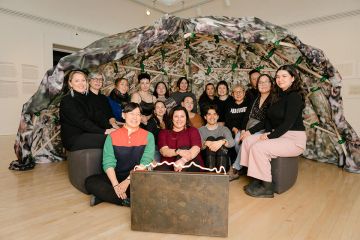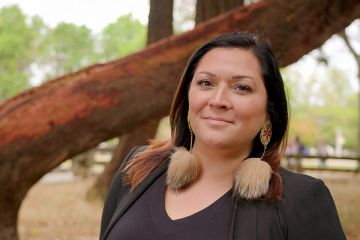From resin to computers, the untold story of the sound of music

We take for granted how we listen to music. It seems simple and automatic—but it’s not. Fibre-optic cables, power lines and ecological impact are all key factors in how music is produced and consumed world-wide. This month, sound anthropologist Alexandrine Boudreault-Fournier will bring together researchers from Europe, Asia and the Americas to the University of Victoria to explore what’s behind music and sound production.
They will focus on the journey from raw material to end product, not on the composition and playing of music.
“We find unexpectedly intimate connections between the industries of music, forestry, shipping, mining and chemical engineering by approaching music in this way,” says Boudreault-Fournier. “It is also unusual to think of music—supposedly the most ‘immaterial’ of the arts—in grounded or possibly negative terms.”
“Currently we have no way to measure the ecological impact of music, with everything from the disposal of computer hard drives to music festivals that use mega-watts of electricity and server farms that require huge amounts of power to keep cool,” she adds.
Presenters include experts from the University of Oxford, University of Oslo, Princeton University, Cornell University, as well as UVic musicologist Joseph Salem of the School of Music and UVic media studies scholar Jentery Sayers of the Department of English. Discussion topics will range from how shellac (a resin made by the lac bug) was used to make vinyl records to what the shortage of computers and digital equipment, as well as the lack of Internet access, is doing to electronic music production in Cuba.
The Organized Sound Symposium is co-sponsored by UVic and the University of Oslo, and begins Sept. 8. The symposium is open and free to the public but space is limited; advance registration is required.
Funding support is provided by the Social Sciences and Humanities Research Council.
-- 30 --
Photos
Media contacts
Alexandrine Boudreault-Fournier (Dept. of Anthropology) at 250-721-7052 or alexbf@uvic.ca
Anne MacLaurin (Social Sciences Communications) at 250-217-4259 or sosccomm@uvic.ca
Tara Sharpe (University Communications + Marketing) at tksharpe@uvic.ca
In this story
Keywords: computers, sound, music, anthropology, SSHRC, community, research, teaching
People: Alexandrine Boudreault-Fournier





